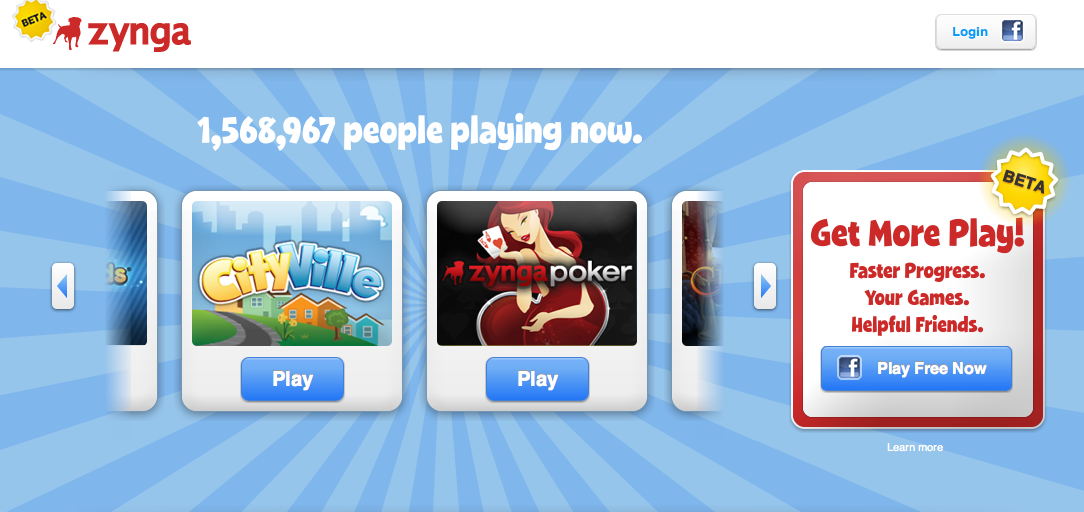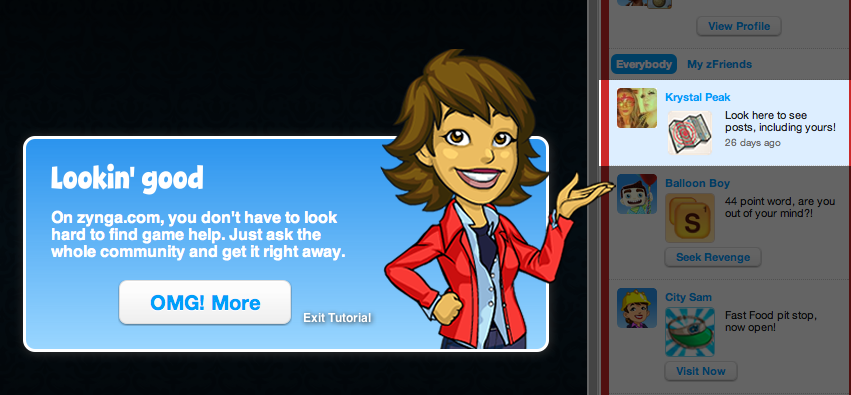
The time has finally arrived: Zynga has its own platform for all the game playing, credit buying, high score boasting you can imagine.
Zynga originally announced its intent to launch an independent platform filled with the virtual world-building, poker, and word games that built Zynga back in October and then last week reminded the public that the new platform was imminent and now it is here.
Some time Monday evening the site went live and now social gamers can play a handful of the Zynga games on the Zynga.com site.
Even the anticipation of this new platform caused Zynga shares to spike on Friday to $15.41, up 7%. That was the highest its traded since its IPO debut on December 16, and extends its rocket-ship ride of 11% in Thursday trading, on news the company’s stand-alone platform is around the corner.
“It’s our hope that our Platform partners, and eventually anyone in the industry, can extend the reach of their games and connect to even more players on Zynga.com. Later this year we’ll make our platform available for all social game developers through a Zynga API,” wrote boss Mark Pincus in a blog post Thursday.

Previously, the San Francisco gaming company had to rely on Facebook (and a few other sites like Google+) to get its usership numbers up and no actual game play was offered on the company site.
This new move is a step to help Zynga show its own strength as an independent company from Facebook — but not a completely severed existence since the Zynga.com platform actually still uses Facebook to create profiles and connect with other people that play the same social games.
And one thing that surprises me is that it still uses Facebook Credits to fulfill virtual goods transactions. What? Most people were expecting Zynga to cut the apron strings a bit more so that it could prove to investors that it could make more revenue on its own — not build a separate platform but continue handing Facebook 30% of the revenue.
When Zynga went public in December, we all learned that more than 90% of Zynga’s $828.9 million revenue (in 2011) was coming from Facebook. That means the company could have made $1.15 billion if it wasn’t cutting Facebook in on its credits. But then you would have to see how many people would play Zynga games if they had to create all new profiles and manually search fro people they know — probably only a fraction.
And Facebook proved just how much it needs the Zynga dollars when it released some of its financials at the start of 2012 with its IPO papers. Zynga accounted for 12% of the Facebook revenue. Yikes. So maybe neither company wants to live too far apart in this symbiotic relationship.
But this doesn’t mean that the new platform lacks new revenue opportunities. Zynga is also launching its Zynga Platform for publishing games built by other developers so it looks like they are getting into the business of helping smaller companies access their 240 million monthly usership pool.
This platform might be very attractive to third-party game developers who want to learn from the Zynga analytics and build its own following.
Zynga will also use a function called zCloud to help the games from smaller developers skyrocket based on demand, rather than being held back by infrastructure (which many have criticized Facebook for). Developers that have already signed up for as Zynga Platform partners including Mob Science and Row Sham Bow.
There is also another difference in the Zynga platform — they can bug players more with gaming content since all of the people on the site are gamers that would find the streaming content relevant — as opposed to the Facebook notes that many of your friends consider spam. This is a great marketing opportunity for developers and Zynga to raise campaign and gaming awareness on a dedicated platform.
The games currently available on the platform are: CastleVille, Words With Friends, CityVille, Hidden Chronicles and Zynga Poker. More third-party games will also be available soon.
Zynga has engineered the game site for speed, so those that have criticized the Facebook gaming speed will enjoy how quickly they level-up and move through challenges.
The play service will be available in 16 languages, including: English, French, Italian, German, Spanish, Portuguese, Turkish, Indonesian, Norwegian, Danish, Dutch, Swedish, Traditional Chinese, Korean, Japanese and Thai.
The platform is open to anyone and is currently considered to be in beta — so expect some glitches to pop up, but also expect a far better gaming ecosphere than you experienced on Facebook or on your mobile devices.
Zynga also rebooted its Web blog for the platform so that they can have a conversation with the gamers on their site and offer a place for suggestions and comments to go.
Now we will have to see just how many people migrate to the Zynga.com platform and what kind of money Zynga will be getting from third-party developers.






















